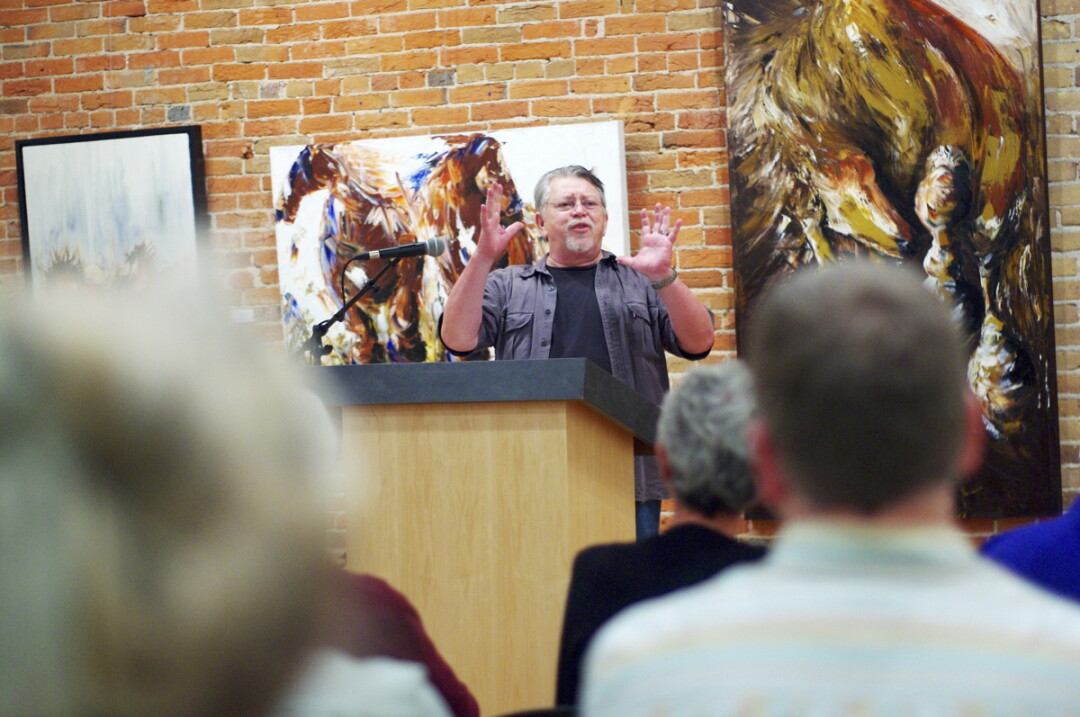Turning the Page
Bruce Taylor retires as Eau Claire’s poet laureate
Doug Pearson, photos by Luong Huynh |

As soon as he became the City of Eau Claire’s Poet Laureate in 2011, Bruce Taylor established a series of monthly open mic events and monthly special programs. “The unstated motto of every ‘open’ poetry reading is that if anyone can read, then everyone must be allowed to,” says Taylor, a professor emeritus of English at UW-Eau Claire. “We may be in a renaissance for poetry. There is probably more poetry being written by people right now in our country than ever before.”
“We may be in a renaissance for poetry. There is probably more poetry being written by people right now in our country than ever before.” – Bruce Taylor, City of Eau Claire’s outgoing poet laureate
And Taylor, whose tenure as poet laureate ends this month, has done more than foster open mics. The goal of these and other programs has been to remind the community that there are very successful writers among us as well as to introduce new writers and programming in a variety of venues: the L.E. Phillips Memorial Public Library, the Janet Carson Gallery, Acoustic Cafe. Some programs have featured local writers such as B.J. Hollars, Jeannie Roberts, Erna Kelly, and Dan Lyksett. Other programs have presented special themes or particular groups such as middle school students, high school teachers, and various local writing groups. In all, Taylor has arranged, publicized, and emceed more than 150 occasions for readers and writers.
Also, when the editors of Volume One created a section called “Local Lit, ” Taylor began encouraging writers to submit their work. The result is that work by more than 40 writers has been featured, ranging from the first-published pieces by middle and high school students to works by national award winners and well-known local figures such as Mike Perry and John Hildebrand.
What are the resources that have created the writer/program director that Taylor clearly is? How did all this get started? “I think I was born an English major,” claims Taylor. He read early and penned an 11-page “novel” when he was 7 years old. In time, this led the Boston boy to apply for graduate programs in creative writing, for a Master of Fine Arts. Admitted in several programs, Taylor chose the University of Arkansas: “It was the furthest away from home and seemed the largest adventure.”
Taylor’s time at Arkansas prepared him for his work as a teacher and promoter of the literary arts. “While other schools produced writers who teach,” Taylor notes, “the emphasis at Arkansas was upon teachers who write.” From Miller Williams, his mentor at Arkansas, Taylor learned that “you could never lie to a student about their work, but you always had to remember you were talking to a person who you are trying to help get better at what they do.”
After Arkansas, Taylor came to the Midwest where he helped start creative writing classes at UW-Eau Claire. Taylor became a mentor for hundreds of young writers, many of whom have become teachers themselves as well as published writers of poetry, novels, short story collections, memoirs, and other nonfiction. Eventually he was the advisor of the students who established and edited a campus creative arts magazine called NOTA, an award-winning publication still regularly appearing at UW-Eau Claire.
In his early years at UW-Eau Claire, Taylor was one of the first Poets in the Schools. Writers were assigned to schools in a national effort to inspire “leaps of imagination.” Taylor says, however, it could be a “real boot camp” experience. “Think you can teach poetry because you’ve been teaching it to college students?” Taylor queries. “Try junior high kids, or second graders, or a room full of hearing-impaired students.”
Taylor’s search for new experiences during his teaching career led him also to teach abroad in South Korea, Australia, and China. In each place, he immersed himself in the culture, struggled with the language, welcomed the new poetry he discovered, and tried translating some of the poetry.
Now, having nearly finished “laureating,” Taylor says that being poet laureate has been “Fun. Rewarding. Frustrating. A lot more work than I thought it was going to be. However, once you’ve been doing something for a while you begin to understand how much to value the people who have helped you. I’m excited about the future. I hope that organizations like the Chippewa Valley Writers Guild, the Chippewa Valley Book Festival, the Eau Claire Regional Arts Center, Volume One, and the L.E. Phillips Memorial Public Library will continue their fine work. Nothing could have been accomplished without them.”
If Taylor has many to thank, it should also be said that writers in this community are grateful to him for the many opportunities he launched.
NEW ‘WRITER IN RESIDENCE’
This spring marks both the end of Bruce Taylor’s tenure as city poet laureate and a change in the program’s name: The position will be now be known as “writer in residence.” The idea is to recognize a wider range of writing and to provide for more variety in the appointments made in the coming years. Max Garland, the state’s former poet laureate and a newly retired UW-Eau Claire English professor, will become the city’s first writer in residence on Tuesday, April 26.




















